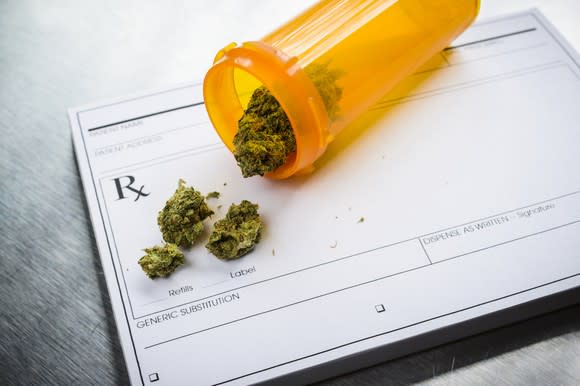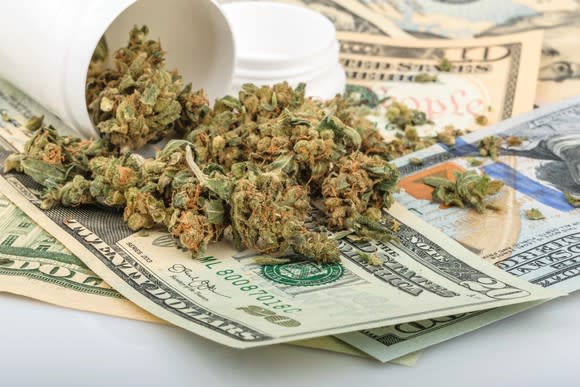2 Must-Read Quotes on Marijuana From FDA Head Scott Gottlieb
This has been an unforgettable year for the cannabis industry. The highlight, as you may have surmised, was the legalization of recreational marijuana in Canada on Oct. 17. The passage of the Cannabis Act ended nine decades of adult-use prohibition and opens the door to what could be $5 billion in added annual sales by early next decade.
It was a meaningful year for the United States, too. During midterm elections last month, two more states approved medical pot initiatives, bringing the total number of states where cannabis is legal in some capacity to 32. As for recreational weed, Vermont and Michigan gave it the green light in 2018, increasing the number of adult-use-legal states to 10. We even witnessed the U.S. Food and Drug Administration (FDA) approving the very first cannabis-derived drug.

Image source: Getty Images.
The FDA's commissioner weighs in on cannabis
Yet, for all the progress made on the marijuana front in North America, the U.S. federal government remains stuck in neutral. Despite its hands-off approach, which has allowed states to decide their own path with regard to cannabis, the drug remains classified as Schedule I, meaning it's entirely illegal, is prone to abuse, and has no recognized medical benefits. But ask the public, and two out of three adults want to see weed legalized nationally, according to an October 2018 Gallup poll.
This begs the question that's on the minds of millions of Americans: When might cannabis reform occur in the United States?
Although that's a question with no definitive answer, FDA Commissioner Scott Gottlieb offered some recent clues in an interview with host Joe Kernen on CNBC's Squawk Box. Toward the end of their on-air discussion, Kernen raised concerns he had about the legalization movement, how it could impact society, and the potential ease of purchasing cannabis like alcohol. Gottlieb had two notable, albeit very different comments on the subject.

Image source: Getty Images.
"No demonstrated medical use of botanical marijuana"
To begin with, Gottlieb's response to marijuana's medical benefits isn't likely to inspire confidence. Said Gottlieb:
Recreational marijuana doesn't fall within our purview right now. But look, we do regulate compounds that are making drug claims and we regulate botanical use of marijuana. We have approved compounds derived from marijuana, but there is no demonstrated medical use of botanical marijuana. That's the bottom line.
Mind you, this comment comes just over five months after the FDA approved GW Pharmaceuticals' (NASDAQ: GWPH) cannabidiol-based oral solution, Epidiolex. Cannabidiol (CBD) is the non-psychoactive cannabinoid best known for its perceived medical benefits, and it won't get a user "high." GW Pharmaceuticals' lead drug dazzled in multiple late-stage studies, which showed it to be superior to placebo in reducing seizure frequency from baseline for patients with two rare types of childhood-onset epilepsy (Dravet syndrome and Lennox-Gastaut syndrome). Epidiolex also received the least-stringent scheduling possible (Schedule V) from the U.S. Drug Enforcement Agency prior to its launch.

Image source: GW Pharmaceuticals.
The fact that the FDA has now approved a cannabis-derived drug, and that 46 out of 50 states allow CBD to be purchased by consumers or prescribed by a physician, has raised the hopes of Americans that real reform is on the horizon. Yet, Gottlieb's comments suggest that the FDA remains highly skeptical of marijuana's medical benefits.
One of the biggest risks to the medical cannabis industry that I've previously alluded to is a potential rescheduling of the drug rather than a removal from the controlled-substances list. As an example, by moving from Schedule I to Schedule II, medical cannabis would come under the direct control of the FDA. The FDA would be able to approve or deny the marketing and packaging of weed-based medical products, and could tightly regulate CBD and tetrahydrocannabinol (THC) content in grown cannabis. THC is the psychoactive cannabinoid that gets users high. Worst of all, the FDA could require all medical claims be proven through rigorous, time-consuming, and costly clinical trials before the drug can be prescribed by physicians.
It's a worrisome stance for the head of the FDA to take if you're a medical cannabis company operating in the United States.

Image source: Getty Images.
"There's an inevitability that it's going to happen at the federal level"
Then again, Gottlieb's take on recreational cannabis could perk up enthusiasts and investors. Said Gottlieb:
There's probably going to be a policy reckoning around this at some point in the future. Obviously it's happening at the state level, and I think there's an inevitability that it's going to happen at the federal level at some point soon.
As noted, 32 states have legalized medical marijuana in some capacity, with 10 states giving the green light to adult-use pot since November 2012. Public approval of pot has also more than doubled (31% to 66%) in the U.S. since the year 2000. This trend certainly favors the public putting pressure on elected officials to make changes on Capitol Hill or face being voted out of office.
There are, however, two pretty sizable obstacles to overcome, even with Gottlieb's belief that federal policy reform is "inevitable."
The first issue is that cannabis simply isn't a big enough topic to change voters' minds. Back in April, Quinnipiac University conducted a survey that asked people the following question: "If you agreed with a political candidate on other issues, but not on the issue of legalizing marijuana, do you think you could still vote for that candidate or not?"
Even with support for pot at an all-time high, 82% of respondents said yes, they could still vote for a candidate that doesn't share their views on cannabis. This suggests that marijuana isn't a polarizing enough issue to push elected officials out of office. Until it becomes more important to voters, lawmakers won't feel pressured to bring up reform on Capitol Hill.

Image source: Getty Images.
The other obstacle is money (surprise!). As a Schedule I drug, marijuana is currently subject to Section 280E of the U.S. tax code, which disallows businesses that sell a federally illicit substance from taking normal corporate income tax deductions, save for cost of goods sold. This leads some pot-based businesses to pay an effective corporate income tax rate of between 70% and 90%.
If marijuana were removed from the controlled-substances list, cannabis businesses would no longer be subject to 280E. While that probably sounds great, it would cost the federal government tax revenue at a time when the federal deficit just hit a six-year high. Some might suggest implementing a federal excise tax on legal product sales, but that would simply drive up the cost of legal weed and push consumers back to the black market. Navigating around this tax revenue issue could prove difficult.
In sum, the outlook for marijuana at the federal level is as cloudy as ever.
More From The Motley Fool
Sean Williams has no position in any of the stocks mentioned. The Motley Fool has no position in any of the stocks mentioned. The Motley Fool has a disclosure policy.

 Yahoo Finance
Yahoo Finance 